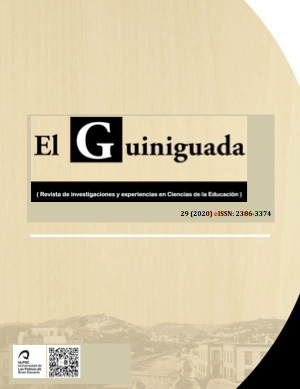Construcción de identidades genéricas desde la educación literaria en el último curso de Secundaria. Construction of gender identities from literary education in the last year of Secondary School.10.20420/ElGuiniguada.2020.336
Palabras clave:
Educación secundaria, identidad, género, feminismoResumen
Este trabajo persigue favorecer una construcción crítica de las identidades genéricas desde la educación literaria en la adolescencia. Los objetivos específicos son el reconocimiento de la feminidad, la masculinidad, el amor y la sexualidad como construcciones culturales (para facilitar el desarrollo de modelos de género y conductas amorosas y sexuales lo más libres y reflexivas posible) y la identificación de ejemplos de la trampa de la mujer total (doble trabajo) y sus consecuencias y de la vinculación entre el tipo de relación de pareja que se entabla y la autoestima/el poder de los participantes. Tras la introducción teórica, presentamos una propuesta de club de lectura dirigida al último curso de Secundaria a partir de tres novelas que reflejan los tópicos y problemas aludidos y el cuestionario pretest-postest (seguimos un diseño cuasiexperimental) que los alumnos contestarían antes y después de su implementación para valorar el desarrollo de los objetivos fijados.
Descargas
Citas
Acker, S. (1995). Género y educación. Reflexiones sociológicas sobre mujeres, enseñanza y feminismo. Madrid: Narcea.
Amorós, C. (2008). Mujeres e imaginarios de la globalización: reflexiones para una agenda teórica global del feminismo. Rosario: Homo Sapiens.
Ballester, J. (2015). La formación lectora y literaria. Barcelona: Graó.
Flecha, C. (2014). Desequilibrios de género en educación en la España Contemporánea: causas, indicadores y consecuencias. AREAS. Revista Internacional de Ciencias Sociales, 33, 49-60.
García de Vicuña, P. (2018). La desigualdad de género en la educación. El diario. Recuperado de https://www.eldiario.es/norte/vientodelnorte/desigualdad-genero-educacion_6_729737035.html
Heredero de Pedro, C. (2019). Género y coeducación. Madrid: Morata.
Herrera Gómez, C. (2017). La construcción sociocultural del amor romántico. Madrid: Fundamentos.
Jónasdóttir, A. G. (1993). El poder del amor. ¿Le importa el sexo a la democracia? Madrid: Cátedra.
Lagarde, M. (1998). Identidad genérica y feminismo. Sevilla: Instituto Andaluz de la Mujer.
Lamas, M. (2015). Usos, dificultades y posibilidades de la categoría de género. En M. Lamas (Comp.), El género: la construcción cultural de la diferencia sexual (313-348). México: Bonilla Artigas.
Martínez León, P., Ballester-Roca, J. e Ibarra-Rius, N. (2017). Identidades fronterizas y pertenencias plurales: diversidad e interculturalidad a través de la educación literaria. Didáctica. Lengua y Literatura, 29, 155-172.
Miyares, A. (2006). Multiculturalismo, coeducación y ciudadanía. En R. Cobo (Ed.), Interculturalidad, feminismo y educación (34-54). Madrid: Catarata.
Real Decreto 1105/2014, de 26 de diciembre, por el que se establece el currículo básico de la Educación Secundaria Obligatoria y del Bachillerato. BOE núm. 3 de 3 de enero de 2015.
Subirats, M. (2006). La educación de las mujeres: de la marginalidad a la coeducación. Propuestas para una metodología de cambio educativo. En C. Rodríguez Martínez (Comp.), Género y currículo. Aportaciones del género al estudio y práctica del currículo (229-255). Madrid: Akal.
UNESCO (2018). Resumen sobre género del informe de seguimiento de la educación en el mundo. Cumplir nuestros compromisos de igualdad de género en la educación. París: Organización de las Naciones Unidas para la Educación, la Ciencia y la Cultura.
Valcárcel, A. (1994). Sexo y filosofía: sobre mujer y poder. Barcelona: Anthropos.
Varela, N. (2008). Feminismo para principiantes. Barcelona: Ediciones B.
Publicado
Cómo citar
Número
Sección
Licencia
El Guiniguada se distribuye en abierto bajo una licencia Creative Commons Reconocimiento–NoComercial–SinObraDerivada 4.0 Internacional. Permite pues que los autores/as retengan, sin restricciones, los derechos de autoría así como los de publicación y difusión (esta última en una web personal o en un repositorio institucional). Igualmente, los artículos pueden ser descargables y compartirse siempre que se reconozca la autoría, que no se realicen cambios y que no se utilicen comercialmente (CC BY-NC-ND). En los números anteriores a 2020 los derechos de autor/a eran transferidos a la Revista, pero desde el Volumen 29 (2020) se aplica la política de derechos de autoría actual.
La Revista proporciona por tanto un acceso abierto inmediato a su contenido basado en el principio de que ofrecer al público un acceso libre a las investigaciones ayuda a un mayor intercambio global de conocimiento, de acuerdo con la definición BOAI de acceso abierto. Los autores/as no pagan por publicar en El Guiniguada.
El destinatario principal de esta publicación es la comunidad científica en general. No obstante, dado el interés social de los temas vinculados con la educación, El Guiniguada es consciente de la previsible proyección general que sus volúmenes puedan tener. Su acceso abierto permite, igualmente, el conocimiento libre y general de su contenido.
Quienes publiquen en esta revista aceptan pues los términos siguientes:
- Conservarán sus derechos de autoría y garantizarán a la revista el derecho de primera publicación de su obra, el cual estará simultáneamente sujeto a la Licencia de reconocimiento de Creative Commons que permite a terceros compartir la obra siempre que se indique su autoría y su primera publicación en esta revista. Asimismo, se indica que no se puede hacer un uso comercial de la obra; tampoco está permitido su uso derivado.
- Podrán adoptar otros acuerdos de licencia no exclusiva de distribución de la versión de la obra publicada (p. ej.: depositarla en un repositorio institucional o publicarla en un volumen monográfico) siempre que se indique la publicación inicial en esta revista.
- Podrán difundir su obra a través de Internet (p. ej.: en archivos telemáticos institucionales o en los perfiles académicos o profesionales de los autores...) antes y durante el proceso de envío, lo cual puede producir intercambios interesantes y aumentar las citas de la obra publicada. (Véase El efecto del acceso abierto).
Asimismo y de acuerdo con la política de acceso abierto BOAI, todo el contenido está disponible gratuitamente sin cargo para el usuario o su institución. Los usuarios pueden leer, descargar, copiar, distribuir, imprimir, buscar o vincular los textos completos de los artículos, o usarlos para cualquier otro propósito legal, sin solicitar permiso previo del equipo editorial o de la autoría.
















